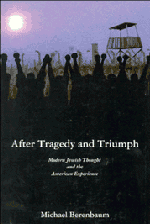Book contents
- Frontmatter
- Contents
- Foreword
- Introduction
- PART I THE HOLOCAUST IN CONTEMPORARY AMERICAN CULTURE
- 1 The Nativization of the Holocaust
- 2 The Uniqueness and Universality of the Holocaust
- 3 Public Commemoration of the Holocaust
- 4 Is the Centrality of the Holocaust Overemphasized? Two Dialogues
- 5 Issues in Teaching the Holocaust
- 6 What We Should Teach Our Children
- 7 The Shadows of the Holocaust
- PART II JEWISH THOUGHT AND MODERN HISTORY
- Notes
- Index
7 - The Shadows of the Holocaust
Published online by Cambridge University Press: 06 January 2010
- Frontmatter
- Contents
- Foreword
- Introduction
- PART I THE HOLOCAUST IN CONTEMPORARY AMERICAN CULTURE
- 1 The Nativization of the Holocaust
- 2 The Uniqueness and Universality of the Holocaust
- 3 Public Commemoration of the Holocaust
- 4 Is the Centrality of the Holocaust Overemphasized? Two Dialogues
- 5 Issues in Teaching the Holocaust
- 6 What We Should Teach Our Children
- 7 The Shadows of the Holocaust
- PART II JEWISH THOUGHT AND MODERN HISTORY
- Notes
- Index
Summary
In the period between the 1967 Six Day War and the ig82 War in Lebanon, world Jewry told a simple story about the implications of the Holocaust. In short, powerlessness invites victimization; therefore, the Jewish people must assume power and engage history as actors rather than victims. The memories of victimization should sensitize the newly empowered community to the urgency of its task, its limits, and its risks.
In the years since the debacle of Lebanon, the legacy of the Holocaust is more complex, more troubled. After the intifada, the lessons of the Holocaust are no less relevant, but the applications seem more illusory. This chapter probes the implications of the Holocaust for a generation that has experienced the joy of Jerusalem's reunification and the pain of occupation. In the aftermath of Israel's greatest victory, it stands at a moral crossroads.
In order to avoid confronting the full implications of the Holocaust, Jews often make the mistake of focusing exclusively on antisemitism. For religious Jews, this approach offers the dubious solace of sidestepping the theological problems raised by the Holocaust. By presuming continuity, the event must be understood within traditional solutions to the problem of evil. Some religious Jews fear that the importance of the Holocaust will be intensified – and even overemphasized – if it cannot be contained within the categories of Jewish history.
As we have seen, the Holocaust differs from previous manifestations of antisemitism in that earlier expressions were episodic, geographically limited, illegal (they took place outside the law), and religiously rather than biologically based. Jews were killed for what they believed or practiced; conversion and emigration were possible.
- Type
- Chapter
- Information
- After Tragedy and TriumphEssays in Modern Jewish Thought and the American Experience, pp. 72 - 86Publisher: Cambridge University PressPrint publication year: 1990



